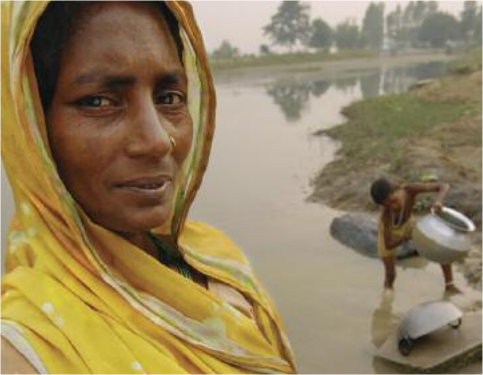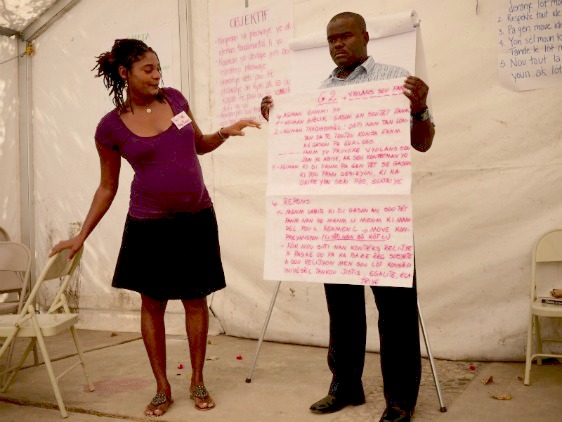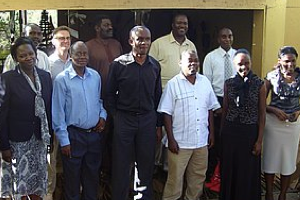Transparency & Accountability


Water and Integrity
Improving water and WASH governance requires improving integrity where specifically strengthening the aspects of transparency, accountability, and participation (TAP) is crucial. Massive investments and aid flowing into the water sector makes it highly vulnerable to corruption. Estimates by the World Bank suggest that 20–40 percent of water sector finances are being lost to dishonest practices. Corruption comes in many different forms and the scope varies across water practices, governance structures and the perceptions and norms of actors involved. Typical examples of corruption include falsified meter readings, distorted site selection of projects, collusion and favouritism in public procurement, and nepotism in the allocation of public offices. In the water sector, observers’ estimate that 20 per cent to 70 per cent of resources could be saved if transparency were optimised and corruption eliminated (GCR 2008). The significant negative impacts of corruption on economic performance, growth and human development are treated as a tenet and control of corruption a core indicator for good governance. To know more about water, WASH, corruption and integrity, visit: www.waterintegrity.org
| Process | Public-Public | Public-Private | Public-Consumer |
| Policy making & regulation | • Policy & regulatory capture on Water Resource Management
• Collusion for cover-up |
• Bribery for water permits, Environmental Impact Assessment or pollution cover up | • Bribe to silence public protests |
| Planning & budgeting | • Distortions in decision on locations, priorities
• Diversion of funds |
• Bribe to influence fund allocation | • Denied access to project plan, budget amount |
| Tendering & procurement | • Cover up, collusion, favouritism in procurement processes | • Kickbacks to influence or secure contracts
• Collusion for inferior material supply |
• Distorted information shared about bidding process |
| Construction phase | • Approve poor quality construction | • Not building to specifications
• False invoicing |
• Corruption in community based construction projects |
| Operation & maintenance | • Ignoring Operation & Maintenance (O&M) | • False documents to show O&M undertaken | • Bribe for illegal connections |
Table: Corruption across stakeholder relations. Credit: Water Integrity Network
FAQ on water integrity
What is integrity?
This is synonymous with honesty and refers to the need for public, private and civil society sector representatives to be honest in carrying out their functions and resist corruption. It requires that holders of public or private office do not place themselves under any financial or other obligation to individuals or organisations that may influence their ability to perform their duties. This is about the need for public, private and civil society sector representatives to be honest in carrying out their functions and to resist extortion and banish corruption. Holders of public or private office should not place themselves under any financial or other obligation to individuals or organisations that may influence their ability to perform their duties or put water services and a clean environment at risk.
What are the main pillars of Integrity?
Transparency – This refers to the right of citizens to access relevant information. Openness and public access to information are vital, so that water-users can understand the decision-making processes that affect them. This makes citizens knowledgeable about the standards to expect from public officials and enables them to protect their rights.
Accountability – Accountability is a broad concept and it entails several dimensions and is often used in different ways. Some see it as a mechanism to hold people and institutions accountable, whereas others may see it as a concept referring to the actual application and implementation of rules and standards. Accountability in a democratic sense according means an individual in a public function or a public institution must answer for their actions. This includes political, administrative, and financial dimensions.
Participation – Participation is a term with many different meanings. Some stress that it refers to the most basic indication of democratic rule that whoever is affected by a decision should, one way or another, directly or indirectly, have the chance of intervening in and influencing such decisions. It is also argued that participation fosters ownership in the sense that decisions are increasingly accepted and implemented by the involved actors. WIN believes in civil society’s right and responsibility to play a role in the water sector decision-making process and in holding officials and those in public service to account. It is important to make use of available data and information to monitor decision-making and progress on governance and corruption.
Defining corruption
According to Transparency International, “Corruption is the abuse of entrusted power for private gain.” Corruption is about breaking socially established expectations of appropriate behaviour, and this is why a cultural approach is so important. Corruption is an exchange of either economic or social resources. Corruption does not only take place in the public sector, it also occurs in non-governmental organisations and private enterprises. Common examples include cutting red tape in applications for reservoir water abstraction or expediting a household’s connection to municipal water supplies. Falsifying water meter readings, for example, is an equally corrupt practice if it takes place in a private water company as in a public utility.
Forms of corruption
- Bribes and kickbacks: One of the most cited form of corruption; they may include the payment of a fixed sum, a percentage of a contract or in-kind favours. It is given to unduly influence some action or decision on the part of the recipient or beneficiary. Users for example may pay a small amount of money to have their meter reading falsified and bills lowered or to speed up repairs or the connection process. This can equally occur at higher levels within the chain of service provision.
- Collusion/ complicity: an arrangement between two or more parties designed to achieve an improper purpose, including influencing improperly the actions of another party. The most common form of collusion is when bidders agree among themselves on prices and “who should win.” This may or may not involve paying bribes to government officials so that they may “turn a blind eye” to the practice.
- Fraud: Based on manipulation or distortion of information for private gain including the falsification of receipts and other documents. The use of misleading information to induce someone to turn over money or property voluntarily, for example, by misrepresenting the amount of people in need of a particular service.
- Favouritism, clientelism, cronyism and nepotism: The use of entrusted power to provide preferential treatment to friends, family, business partners, political parties etc. This form of corruption often goes beyond individual interest and may include attempts to realign power structures for the accumulation and maintenance of power, status and wealth. Thus, it represents the infiltration of non-democratic paths to political and economic domination.
- Extortion: The use of coercion to force an action or induce complicity. It can include threats of violence or of exposing damaging information in order to induce cooperation.
- Embezzlement and theft: This includes the direct taking of money or property for personal enrichment out of public property. Not all cases of theft are considered corrupt, as it depends who is being stolen from, and if entrusted power is being abused. It might involve diversion of public funds to one’s own bank account or stealing equipment from the water utility’s warehouse.
What is Water Integrity Network?
The Water Integrity Network (WIN) is an action-oriented coalition of organisations and individuals promoting water integrity to reduce and prevent corruption in the water sector. WIN’s vision is a world with equitable and sustained access to water and a clean environment, which is no longer threatened by corruption, greed, dishonesty and willful malpractice. WIN’s mission is to increase integrity levels and reduce corruption in the water sector through a pro-poor and pro-equity focus. It works with partners and influences decision-makers to facilitate active multi-stakeholder coalitions and to build capacities for the use of tools and strategies for water integrity at all levels. The WIN secretariat is located in Berlin, Germany. To know more, please visit: http://www.waterintegritynetwork.net/
The IRC programme for Transparency & Accountability
IRC has a programme that supports improved transparency and accountability to reduce sector corruption through activities including advocacy, action research, dissemination of publications, events and training and advice.
- Developing a water anti-corruption strategy in Mozambique: The IRC International Water and Sanitation Centre are supporting Cowater Consultores Lda. to develop an appropriate anti-corruption strategy and plan with the Direcção Nacional de Águas (DNA) in Mozambique.
- IRC signs up to the INGO accountability charter: IRC has signed up to the INGO accountability charter, an action intended to help strengthen the accountability of our organisation.
- Training manual on water integrity: IRC was one of the WIN members which contributed to a new training manual on water integrity published by SIWI, WIN, CapNet and WATERnet. IRC's Alana Potter was contracted to design the learning process and finalise the text. Many of the materials and exercises were tested during IRCs preventing corruption training. We envisage using this excellent guide in future training courses.
- IRC experience on transparency and accountability: Summary information on IRC activities, information products and expertise in WASH sector transparency and accountability issues.
- Publications: A selection of available publications on transparency, accountability and integrity in the water and sanitation sector from IRC and partner organisations.
- Training and advice: IRC runs a regular 3-day training workshop (in the Netherlands) on preventing corruption in water, as well as being involved in other training activities and providing advisory support to partners and clients.
- News: News items on corruption issues and measures to promote transparency, accountability and integrity in the water sector from IRC's newsletter Source Weekly.
- Events: Forthcoming events (and resources from past events) on transparency, accountability and integrity organised and involving IRC
- Resources: Internet resources on transparency, honesty and corruption for the water and sanitation sector.
An Introduction to Preventing Corruption
Below, this 37-slide presentation gives advice on how to identify and prevent WASH project corruption.
It favors strategies that help the poor and covers the following topics:
| - Governance, poverty and WASH indicators in 10 countries - Correlation or cause? |
- Decentralization versus centralization in India - Report cards in India |
- Pro-poor, anti-corruption strategies - Diagnose |
Field experiences
The project(s) below are currently using Transparency & Accountability methods.
 Promoting sustainable access to WASH services |
Links
- Tool for Water Integrity: A brief about various tools for assessing integrity in the water sector. Some of the tool manuals are detailed below.
- School Toilets and Integrity. ASSESSING THE SCHOOL WASH PROBLEM IN ANDRHA PRADESH WITH AN INTEGRITY LENS.
- How the Human Right to Water and Sanitation Gives a New Drive to Water Integrity: A STEP IN SHARPENING THE LENS TO EVALUATE THE IMPACT OF CORRUPTION IN THE WATER SECTOR.
- Training manual on water Integrity - This training manual deals with the issue of integrity and anti-corruption in the water.
- Tackling the Integrity Risks Faced by River Basin Organizations. ADAPTING THE INTEGRITY MANAGEMENT TOOLBOX TO SUPPORT River Basin Organizations (RBO)s.
- Corruption Assessment in Basic Services: Defines corruption assessment in basic services as these tools and methods which aim to diagnose corruption and/or corruption risks in the delivery of education, health and water and sanitation services.
- Communication and Awareness-Raising: Raising awareness and inspiring action through transparency, advocacy and capacity development.
- Citizen Report Cards (CRC): This interactive learning tool is designed to assist individuals and organizations interested in carrying out a Citizen Report Card (CRC) study in the water and sanitation sector.
Acknowledgements
- GCR - Global Corruption Report 2008: Corruption in the water
- Water Integrity Network (WIN)
- Corruption and Integrity, Water Integrity Forum Background Paper
- Transparency and integrity. IRC.
